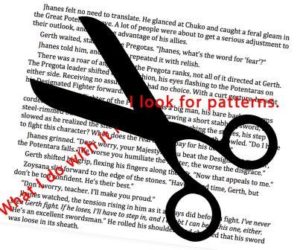 This should be called “Mistakes I Made That You Shouldn’t” series. Once more, you lucky people
This should be called “Mistakes I Made That You Shouldn’t” series. Once more, you lucky people are going to will get the benefit of my lengthy writing experience. As in, lengthy writing is the problem. In other words, I’m editing a novel I wrote several years ago and cutting out all the junk I have since learned not to put in. If some of you are now where I was then, these examples could be of use in tuning help tighten up your own language. Let’s see how many words we can save if we are firm with ourselves. Continue reading “Writing Tip: Trim Your Language”
Tag: mistakes authors make
Why Can’t Writers Kill the Little Darlings?
 Many of you have no doubt heard the infamous quote by William Faulker, “In writing, you must kill your darlings.” If you haven’t, or you don’t understand this, it means that in our writing, we authors at times may inject characters, scenes or story elements because WE like them, not because the story demands them. I’ve certainly battled this myself. In a recent book I was writing, I had an idea to stick an Airedale in there. I have an Airedale, love them to pieces, and I thought I could write one in just for kicks. I fully intended to, knowing from the get-go that it had nothing to do with the story and was just a bit of fluff that served no purpose except I liked it. Well, the story unfolded, I wrote the whole book and, guess what? No Airedale. There was no place for it in the story. Oh, sure, I could go back and shoehorn it in; I could jam it in there somewhere. But the story didn’t call for it. The story didn’t demand it. Ergo, no Airedale. Continue reading “Why Can’t Writers Kill the Little Darlings?”
Many of you have no doubt heard the infamous quote by William Faulker, “In writing, you must kill your darlings.” If you haven’t, or you don’t understand this, it means that in our writing, we authors at times may inject characters, scenes or story elements because WE like them, not because the story demands them. I’ve certainly battled this myself. In a recent book I was writing, I had an idea to stick an Airedale in there. I have an Airedale, love them to pieces, and I thought I could write one in just for kicks. I fully intended to, knowing from the get-go that it had nothing to do with the story and was just a bit of fluff that served no purpose except I liked it. Well, the story unfolded, I wrote the whole book and, guess what? No Airedale. There was no place for it in the story. Oh, sure, I could go back and shoehorn it in; I could jam it in there somewhere. But the story didn’t call for it. The story didn’t demand it. Ergo, no Airedale. Continue reading “Why Can’t Writers Kill the Little Darlings?”
6 Overused Phrases and What They Reveal About Your Writing
 One of the most difficult things for authors to do is improve the tone or style of our writing. Tone especially is a nebulous, hard-to-define quality that is essential to the reader’s enjoyment of our work, but we rarely get specific feedback about it, or find any way we can fix it if something is wrong. And feedback is essential, because these qualities are so intuitive that it is difficult to self-analyze. It’s easy to figure out that you use more commas than most writers. It’s much more difficult to realize that you sound “preachy,” and even harder to fix the problem.
One of the most difficult things for authors to do is improve the tone or style of our writing. Tone especially is a nebulous, hard-to-define quality that is essential to the reader’s enjoyment of our work, but we rarely get specific feedback about it, or find any way we can fix it if something is wrong. And feedback is essential, because these qualities are so intuitive that it is difficult to self-analyze. It’s easy to figure out that you use more commas than most writers. It’s much more difficult to realize that you sound “preachy,” and even harder to fix the problem.
However, there is one way of getting into the depths of your own writing: analyze your overused words. Continue reading “6 Overused Phrases and What They Reveal About Your Writing”
The Next Seven Book Reviewer Complaints
 Everyone had so much fun with the last seven complaints I had while reviewing books, I thought I’d give them a chance to get right down to some more. Some are a bit esoteric, but when a reviewer is really busy and looking for an excuse to go on to the next book, a few of these will do the trick every time.
Everyone had so much fun with the last seven complaints I had while reviewing books, I thought I’d give them a chance to get right down to some more. Some are a bit esoteric, but when a reviewer is really busy and looking for an excuse to go on to the next book, a few of these will do the trick every time.
This is feedback from everyone in comments on the earlier post. NEVER, EVER, EVER bore the reader with an Information Dump. I know you need us to know the whole life story of the main character, but we don’t know we need to know it, so why read it? So we put your book down after Page three.
When is an information dump not an information dump? Never. The only time information is okay is when we don’t notice it, or, best yet, when we want the information. If you can set up a situation where the reader feels like, “Why is he doing that? WHY is he doing that? WHY IS HE…? Oh! That’s why!” then you’ve got it nailed.
Part A: Developmental Errors Continue reading “The Next Seven Book Reviewer Complaints”
